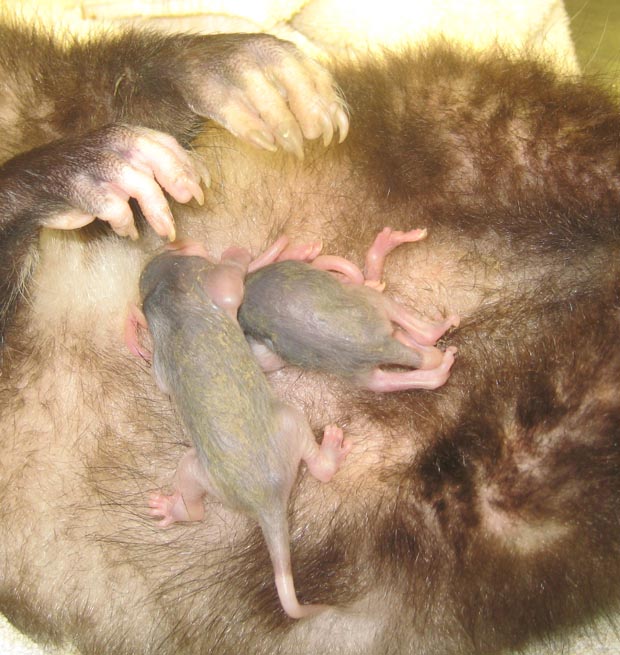
Marsupials (pouched mammals) are different from other mammals in that they carry their offspring in a specialized pouch on the abdomen, called a marsupium. They give birth to live young, which are hairless and undeveloped; these are also known as altricial young, which refers to creatures born in a helpless, immature condition and that will require a lot of care. These young then blindly climb inside their mother’s specialized pouch to suckle and continue developing. As they mature, they climb in and out of the pouch, sometimes riding on their mother’s back.
The Virginia, or common, opossum, is the only marsupial found in North America and is colloquially called a ’possum. As scavengers, opossums thrive in and around human habitation, eating organic garbage and carrion as well as grass, fruit, nuts, mice, birds, insects, worms, snakes and even chickens. The opossum originated in South America and migrated north once the two continents were joined.
Another unique physical characteristic of the opossum is the prehensile tail, which is strong and flexible and used for stability as they climb and forage in trees. While not quite strong enough for an adult to hang from, the babies occasionally do for short periods.
Playing ’Possum
This term arose from the opossum’s curious habit of going completely limp when threatened by a predator, appearing to be dead in the hopes of getting away when the attacker loses interest. Most predators are stimulated by movement, so they tend to become less aggressive if their prey isn’t moving. While this method may have drawbacks, it could be more successful than trying to outrun an attacker, since opossums are not particularly fast runners.
Interesting Facts about Opossums:
- Their robust immune system gives them partial (or sometimes complete) immunity to the venom of most pit vipers (rattlesnakes, cottonmouths, etc.)
- Only about one in eight hundred opossums carries the rabies virus.
- Female opossums can give birth to 20 babies at a time, all of which could fit into a single teaspoon.
Wild Opossums on Your Property
If an opossum happens to become trapped in your garage or porch, the Opossum Society of the United States (OSUS) has good advice for safely helping it back out to the outdoors:
“An opossum can safely be trapped by leaning an empty tall kitchen trash can at approximately a 30º to 45º angle against something the opossum can climb onto, such as a stack of books. Place cat food or ripe fruit at the bottom of the trash can. The opossum will be able to climb into the trash can but will be unable to climb or jump out. Immediately take the trash can outside. Tip the can on its side, and the opossum will leave when it feels that it’s safe to do so.
This is best done at dusk. If it has to be done during the day, tip the opening toward a dense shrub where the opossum can hide until nightfall.
You can also try to leave a trail of pet food leading to an open door. Observe quietly at a distance. Once it leaves, shut the door. Do not try to push the opossum with a broom. The frightened animal will freeze and not move.”
Don’t try to handle any type of wild animal, since there’s a risk of getting bitten (remember, opossums can carry rabies, like many other animals). Be sure to thoroughly clean any container or area where a wild opossum has been trapped or carried, since they can also transmit the bacterial infection leptospirosis in the urine.
Orphaned Opossums
If you happen to find an orphaned baby opossum, you can contact your local animal shelter and ask for a referral to an OSUS volunteer. Long Beach Animal Care Service can be reached at 562.570.7387.
Keeping opossums or any wild animal as pets is not recommended nor is it legal in most states, including California. And it’s not in the best interests of the animal—raising a wild animal is not the same as raising a puppy or kitten. If not fed the proper diet or if early signs of illness are not recognized, then the opossum will suffer and possibly die. You can contact OSUS or a licensed wildlife rehabilitator for volunteer opportunities if you’re interested.
Long Beach Animal Hospital takes in wildlife and addresses their health needs and injuries. You can find out more on our website.

